Understanding the Power of Peer-Mediated Instruction
Peer-mediated instruction (PMI) has emerged as a transformative strategy within ABA therapy to support children with autism spectrum disorder (ASD). This approach leverages the natural social learning capabilities of peers to foster meaningful, lasting improvements in social skills, communication, and social integration. Recognized by research as an evidence-based practice, PMI offers practical, scalable methods to enhance interventions and promote inclusive environments, both in schools and community settings.
Defining Peer-Mediated Instruction in ABA Therapy
What is peer-mediated instruction in ABA therapy, and why is it important for children with autism spectrum disorder?
Peer-mediated instruction (PMI) in Applied Behavior Analysis (ABA) therapy is an approach that involves training typically developing peers to interact, model, and support children with autism spectrum disorder (ASD). Instead of relying solely on adult-led interventions, PMI harnesses the influence of peers to foster social skills such as initiating conversations, responding appropriately, sharing, and understanding social cues.
The significance of PMI lies in its ability to embed social skill development within natural, everyday settings like schools, camps, or community centers. This method not only encourages children with ASD to engage more frequently in social interactions but also promotes skill retention and generalization across different environments.
Core components and processes
PMI involves several essential elements that work together to enhance social learning:
| Component | Description | Additional Details |
|---|---|---|
| Peer Selection | Peers are carefully chosen based on their strong social and academic skills. | They serve as role models and facilitators for social interactions. |
| Training | Peers are trained to understand the needs of children with ASD and how to support social interactions effectively. | Training includes coaching on praising, encouraging, and facilitating turn-taking. |
| Supervision & Support | Teachers or therapists oversee initial interactions to ensure appropriate engagement. | Support gradually decreases as children become more comfortable with social activities. |
| Activities | Engaging in orientation, proximity play, and joint activities such as sharing, taking turns, and group games. | These behaviors promote social responses and communication. |
| Reinforcement | Peers are encouraged to praise and assist, creating a positive atmosphere for social growth. | Encouragement helps foster motivation and a supportive environment. |
The Process
The process starts with identifying the social goals aligned with the child's Individualized Education Program (IEP). Peers are then trained and introduced to activities that promote social engagement. During play or classroom activities, peers model appropriate social behaviors, reinforce positive interactions, and provide feedback. Over time, as the child with ASD demonstrates increased confidence and skills, the level of adult support is gradually reduced.
Research studies show that PMI successfully increases social motivation, improves social communication, and reduces undesirable behaviors. It boosts opportunities for real-world social interactions, which can lead to long-lasting improvements in social networks and friendships.
In summary, peer-mediated instruction in ABA is a practical, evidence-based approach that leverages natural social dynamics. Its core elements—peer selection, training, supervision, meaningful activities, and reinforcement—ensure that children with ASD can learn essential social skills within everyday contexts, ultimately fostering smoother social integration and better quality of life.
Research Evidence Supporting PMI Effectiveness
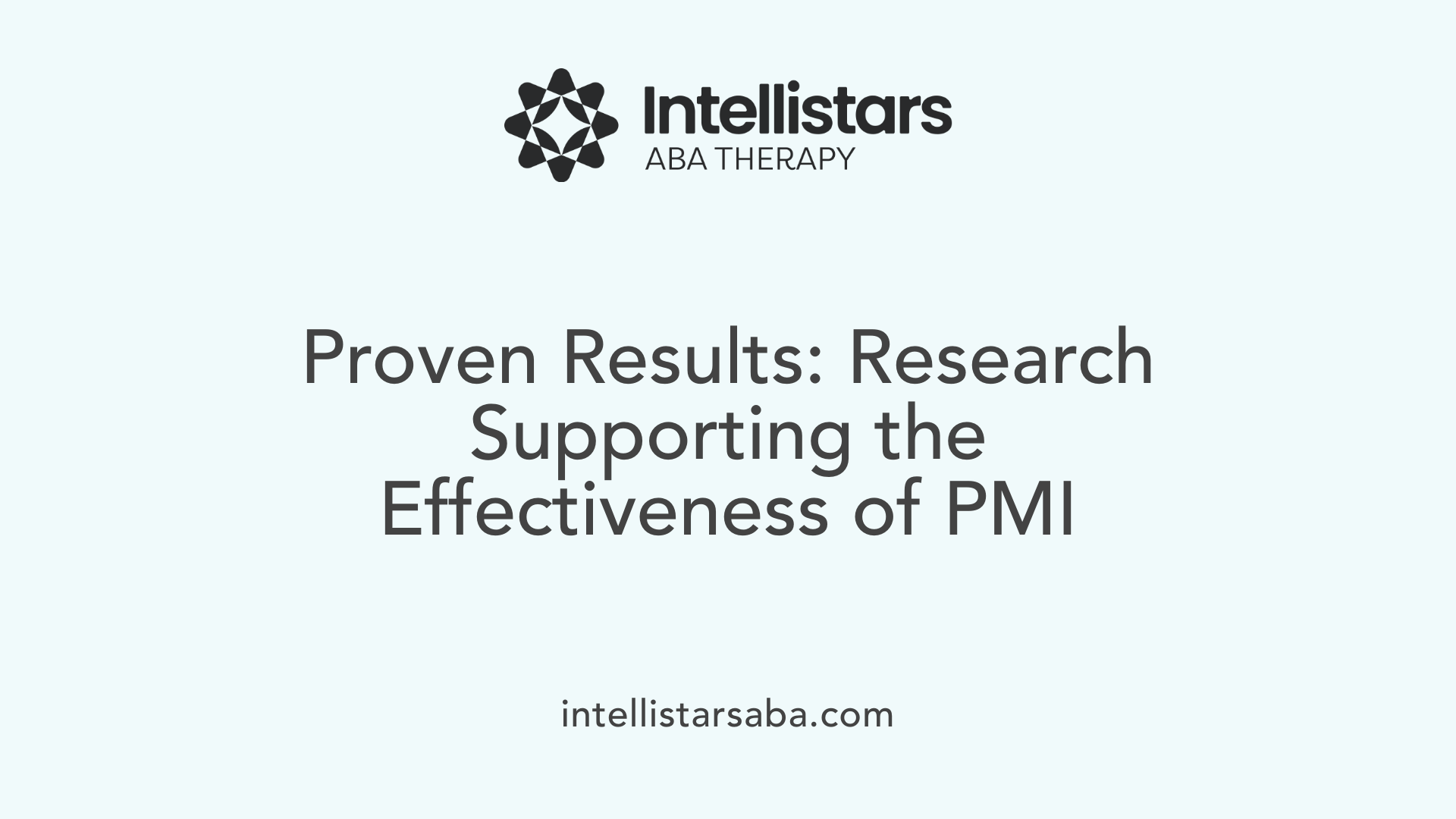
What study designs and settings support PMI research?
Several studies have employed rigorous research methodologies like randomized controlled trials to evaluate the effectiveness of peer-mediated intervention (PMI). For instance, one notable study was a randomized, single-blind, controlled trial involving 55 children aged 4 to 12 years diagnosed with autism spectrum disorder (ASD). This study was conducted in a hospital environment, demonstrating PMI's effectiveness outside traditional school environments. Additionally, other research has involved multiple settings including schools, camps, and community-based programs, highlighting PMI’s versatility.
The studies collectively underscore the practicality and adaptability of PMI across different real-world contexts. Most of the research focused on early childhood and elementary settings, aligning with critical periods for social development.
Who are the sample characteristics in these studies?
Participants in the examined research are children diagnosed with ASD, primarily with mild to moderate impairments. For example, in the randomized trial, the children ranged from ages 4 to 12 years. The samples often include children with varying social and communication skills, thus providing a broad understanding of how PMI can support diverse needs.
Peers involved in PMI are carefully selected based on strong social and academic abilities. These typically developing peers are trained to serve as social models, assist in social learning, and foster positive interactions.
What are the major findings on social skills improvement?
The collective findings from multiple studies demonstrate significant gains in various social domains:
- Social responsiveness: Children show increased initiation of social interactions and improved responses during peer interactions.
- Social motivation: There is a notable increase in willingness and enthusiasm to engage with peers.
- Communication skills: Both verbal and non-verbal communication improve as children learn appropriate ways to interact.
- Reduction of undesirable behaviors: Maladaptive behaviors decrease as children are engaged in positive social activities.
- Friendship and social network inclusion: Children are better able to make friends and are more included within peer groups.
These improvements are observed not only immediately after interventions but also tend to generalize across different environments, such as home, school, and recreational settings. Moreover, the studies highlight the importance of fidelity in implementation, ensuring consistent training and support for peer partners.
| Study Setting | Participants | Age Range | Main Outcomes | Additional Details |
|---|---|---|---|---|
| Hospital | Children with ASD | 4–12 years | Improved social skills & communication | Focus on social motivation and reducing negative behaviors |
| School | Children with ASD | Varies | Increased social initiations & friendships | Peer modeling and classroom-wide programs |
| Camp | Children with ASD | Varies | Generalization of social skills to real-world settings | Adapted for recreational environments |
Overall, research strongly supports PMI as an effective intervention to enhance social skills in children with ASD. Its application across diverse settings and with varied participant groups demonstrates its versatility and efficacy.
How Peer-Mediated Strategies Impact Social Development
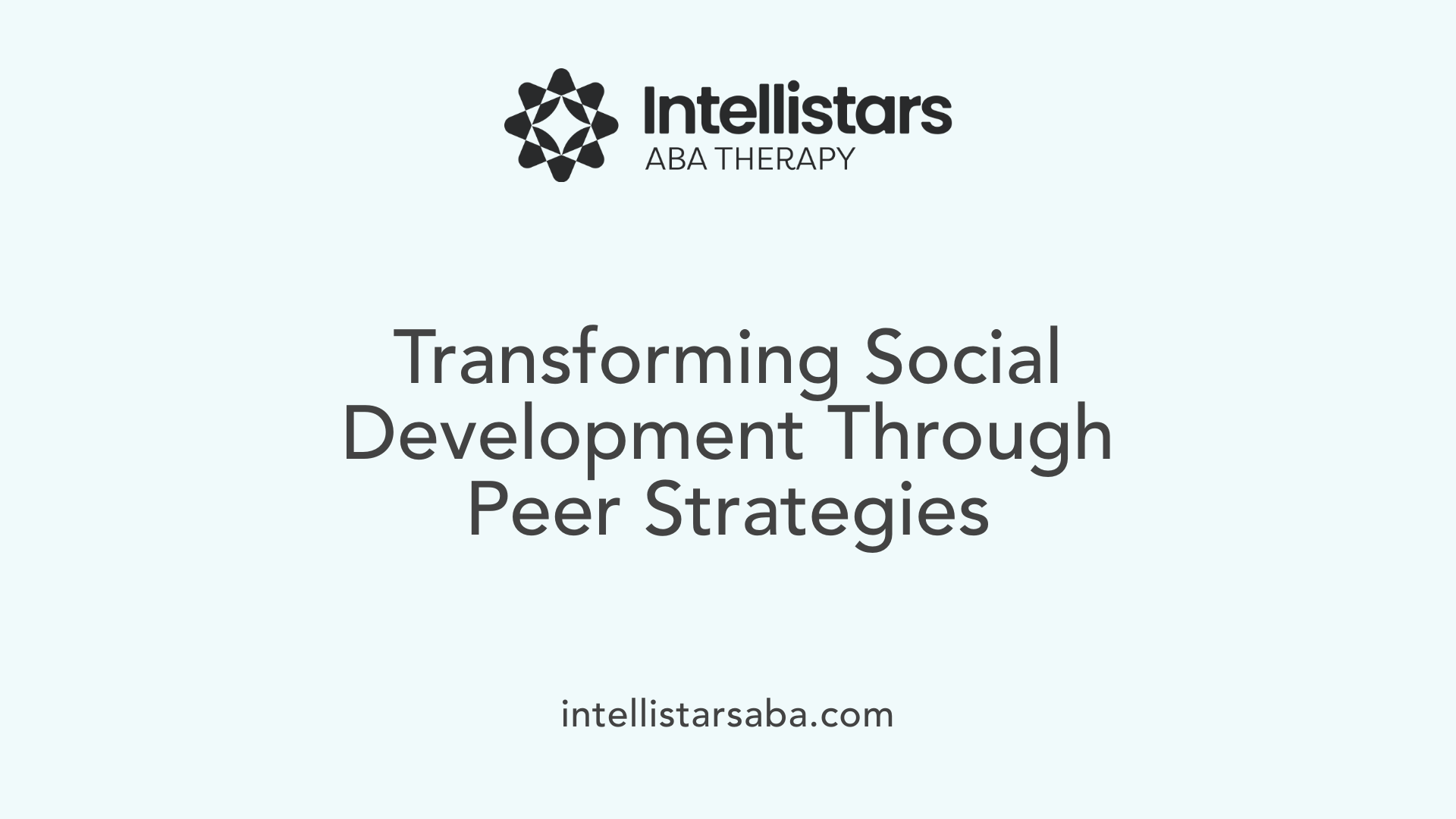
How does peer-mediated intervention support social skills development in children with autism?
Peer-mediated intervention (PMI) plays a vital role in enhancing social skills among children with autism spectrum disorder (ASD). This approach strategically involves typically developing peers who are trained to serve as social models and active social partners. These peers help children with ASD practice and learn fundamental social behaviors in natural, engaging settings.
In PMI, peers are educated in strategies such as demonstrating appropriate social responses, providing encouragement, and reinforcing positive interactions. This active involvement encourages children with ASD to initiate conversations, respond more appropriately, and develop reciprocal communication skills. The training structure often includes observing peers, engaging in shared activities, and receiving immediate praise and reinforcement, which fosters a supportive environment for social growth.
A wide array of empirical studies, including randomized controlled trials and observational studies, support the effectiveness of PMI. Findings consistently show marked improvements in social motivation, peer acceptance, and interactions. Specifically, children with mild to moderate ASD demonstrate significant increases in social communication and reductions in undesirable behaviors following peer-mediated strategies.
The versatility of PMI allows it to be implemented across varied environments such as schools, camps, and rehabilitation centers. Its success depends on careful selection and training of peers, aligning activities with individual goals, and ongoing support from educators or therapists. This practice has gained recognition as an evidence-based approach, endorsed by organizations like the National Professional Development Center on Autism Spectrum Disorders.
Overall, PMI leverages the natural ability of peers to teach social skills in a meaningful way. By fostering inclusive interactions and peer support, it facilitates natural social engagement and helps children with autism better integrate into their social communities.
Core social skills targeted
| Skill Area | Description | Implementation Strategies |
|---|---|---|
| Social Initiations | Encouraging children to start interactions | Peer modeling, visual supports, prompts |
| Reciprocal Responses | Responding appropriately to peers' social cues | Reinforcement, role playing |
| Sharing and Turn-Taking | Engaging in shared activities and games | Structured activities, direct instruction |
| Social Communication | Using verbal and non-verbal language appropriately | Peer modeling, social skills training |
| Peer Acceptance | Building friendships and social networks | Inclusive activities, praise |
Significance of early intervention
Early implementation of PMI, especially in preschool and elementary settings, is crucial. Young children are more adaptable and open to learning new social behaviors. Early intervention helps address core ASD deficits promptly, building strong foundations for social communication and reducing the likelihood of social isolation later in life. By embedding PMI within classroom routines and daily activities, educators can promote ongoing social engagement and foster inclusive peer relationships.
Empirical support and outcomes
Research across multiple settings affirms the positive impact of PMI. There are five notable studies, primarily conducted in school environments, demonstrating consistent improvements in social initiate behaviors, peer interactions, and communication skills. Participants often show increased social network inclusion, better non-verbal social skills, and more frequent play with peers.
The studies also highlight important aspects like the sustainment and generalization of learned skills. Most interventions reported high fidelity in implementation, meaning the procedures were followed as intended, thus increasing confidence in their effectiveness.
| Study Setting | Number of Participants | Main Improvements | Additional Notes |
|---|---|---|---|
| School environment | 55 children, ages 4–12 | Increased social initiation, communication | Follow-ups reveal maintained gains, generalization to new settings |
| Camp setting | Not specified | Enhanced social responses, peer acceptance | Demonstrates PMI's flexibility beyond traditional classrooms |
This growing body of evidence underscores that carefully designed peer-mediated interventions are a practical, effective, and scalable approach to improving social skills, helping children with ASD develop meaningful and lasting social connections.
Implementing Peer-Mediated Instruction in Practice

How can peer-mediated instruction be practically implemented in ABA therapy?
In ABA therapy settings, peer-mediated instruction (PMI) can be a powerful approach to enhance social skills among children with autism spectrum disorder (ASD). Practical implementation begins with the careful selection of peers. Typically developing children are chosen based on their strong social skills, positive behaviors, and ability to model appropriate interactions.
Once selected, these peers receive targeted training. Training procedures involve teaching them specific social strategies such as modeling desired behaviors, using positive reinforcement, prompting social responses, and encouraging cooperation. This training often includes role-playing scenarios, social stories, and discussion of how to interact with children with ASD.
Activities are designed to promote natural, engaging interactions. For example, children may participate in group games, collaborative projects, or role-playing exercises that mimic everyday social situations. These activities are organized to facilitate meaningful peer-to-peer engagement, such as taking turns, sharing, or initiating conversations.
Monitoring is vital to ensure fidelity of the intervention. Teachers or therapists supervise initial interactions, provide feedback, and adjust activities as needed. Over time, support is gradually reduced as children become more comfortable and capable of engaging independently.
Implementation also emphasizes integrating PMI within natural environments like classrooms, playgrounds, or after-school clubs. This integration helps children generalize social skills across settings, making the intervention more effective.
In summary, effective practice involves careful peer selection, structured training, engaging activities, ongoing supervision, and embedding the intervention in everyday settings. This comprehensive approach encourages naturalistic peer interactions that promote social development in children with ASD, helping foster meaningful friendships and social competence.
Theoretical Foundations and Research Backing for PMI
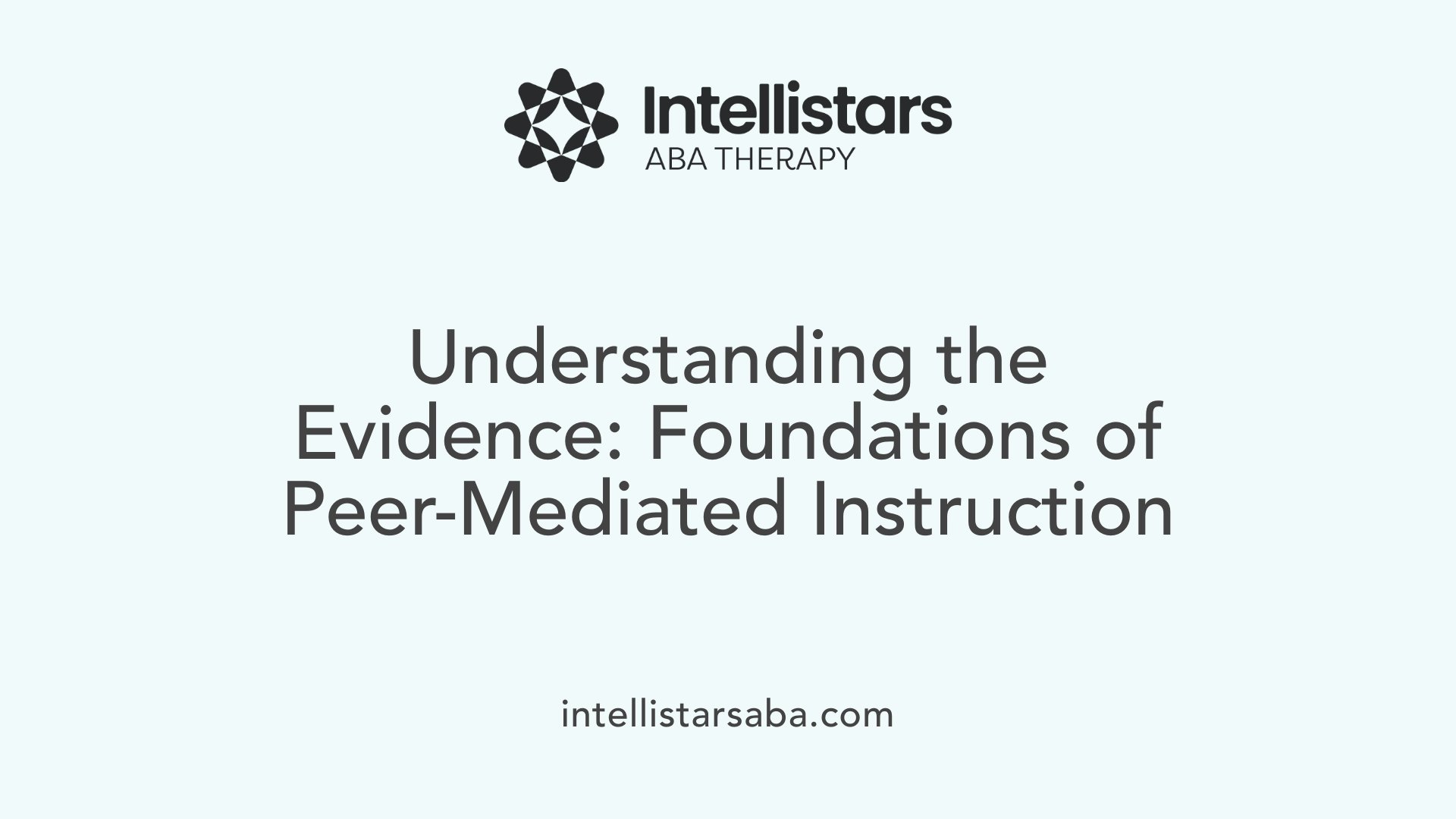
What is the theoretical foundation behind peer-mediated instruction, and what does research say about its effectiveness?
Peer-mediated instruction (PMI) is rooted in social learning theory, which posits that children can acquire new social skills by observing and interacting with their peers. The approach leverages the natural social environment to promote learning through modeling, reinforcement, and peer interactions.
Research studies consistently confirm PMI as an effective and evidence-based practice for children with autism spectrum disorder (ASD). A variety of high-quality investigations, including randomized controlled trials, have demonstrated measurable improvements in social engagement, initiation, and communication.
For example, a notable controlled trial involving 55 children aged 4 to 12 years with ASD found that PMI significantly decreased Social Responsiveness Scale (SRS) scores compared to traditional applied behavior analysis (ABA). Children receiving PMI showed notable advances in social motivation, communication, and reductions in problematic behaviors.
Furthermore, multiple studies conducted across school and camp settings have reinforced PMI’s effectiveness in real-world environments. These studies reveal increased opportunities for practicing social skills, greater inclusion within social networks, and improved play behaviors. They also highlight improvements in non-verbal social cues, reciprocal interactions, and peer friendships.
Implementation research indicates that when peers are carefully selected and trained, the intervention can be adapted across different contexts, including classroom-wide programs, peer modeling, and social skills groups. Over time, with gradual fading of support, children with ASD tend to demonstrate improved social independence and communication.
In summary, the theoretical basis of PMI combined with extensive research findings affirms its role as a reliable, practical method for fostering social development in children with ASD. Its application across diverse settings and consistent positive outcomes make it a well-supported strategy for promoting inclusive social interactions.
Practical Considerations for Integrating PMI in ABA Programs
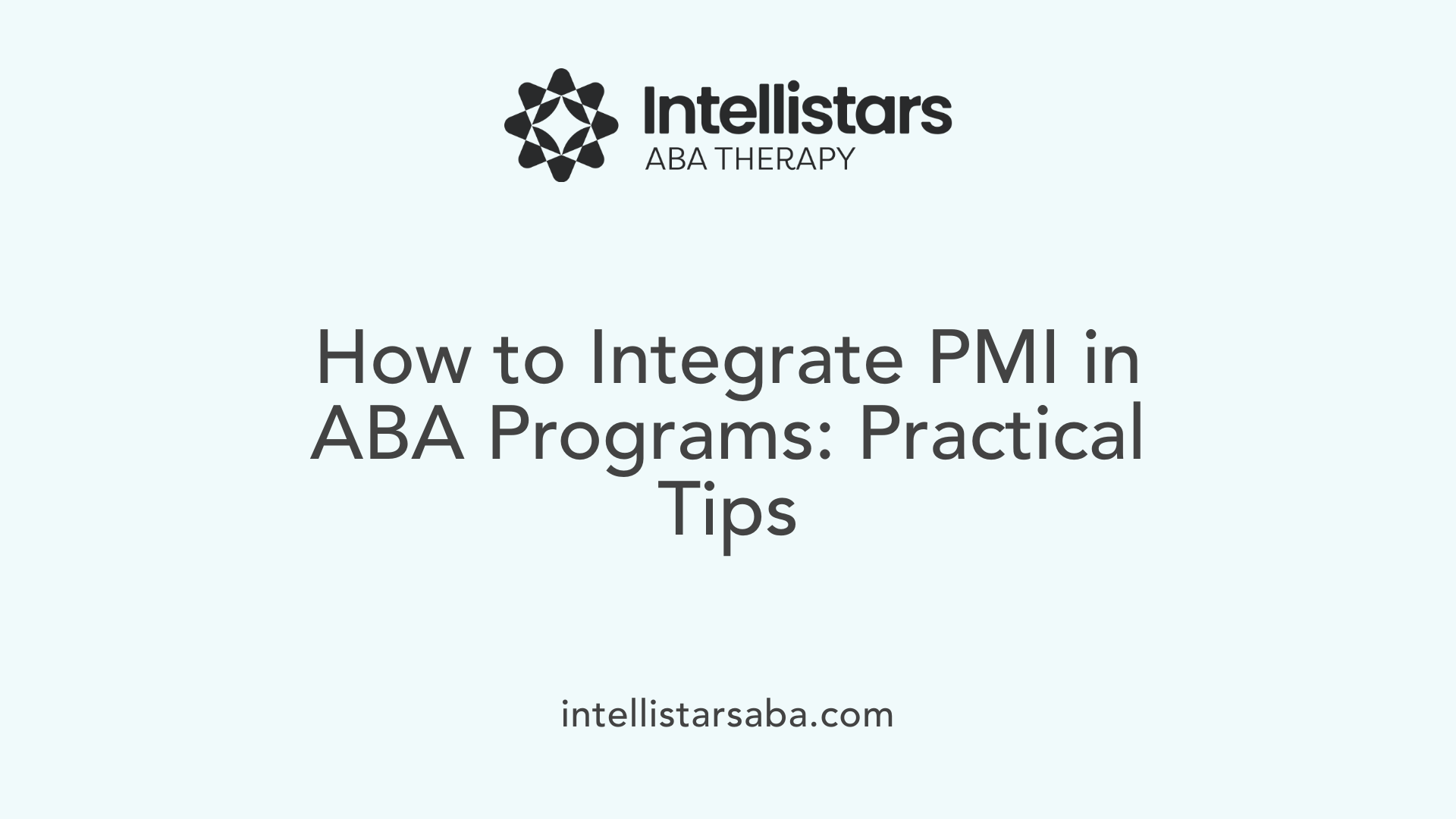
Aligning procedures with IEP goals
When incorporating peer-mediated intervention (PMI) into ABA programs, it is crucial to align the intervention techniques with the child's Individualized Education Program (IEP) goals. These goals often focus on developing specific social, communicative, or behavioral skills. Teachers and therapists should carefully review the IEP to identify relevant objectives such as increasing social initiations, responding to peers, or sharing. The PMI activities can then be tailored to target these specific skills, ensuring that peer interactions promote meaningful progress.
The program should also incorporate measurable benchmarks that align with IEP criteria. This alignment helps demonstrate the effectiveness of PMI in meeting educational goals and provides clear guidance on which peer interactions and activities should be prioritized.
Engaging staff and families
Successful implementation of PMI depends on the active involvement of both staff and families. Teachers and rehabilitation staff need specialized training on how to select appropriate peers, facilitate interactions, and encourage positive social behaviors. Ongoing professional development ensures that staff stay informed about best practices and maintain consistent intervention strategies.
Families play a vital role in supporting social growth beyond structured sessions. Educating parents and caregivers about PMI techniques enables them to reinforce social skills at home and in community settings. Regular communication between school staff and families ensures that social goals are consistent across environments, boosting the child's confidence and opportunities to practice skills.
Measuring progress
Monitoring and evaluating the effectiveness of PMI helps to refine strategies and demonstrate outcomes. Teachers and clinicians should establish clear, measurable indicators of social improvement, such as increased frequency of initiations, longer engagement durations, or improved peer relationships.
Using tools like Social Responsiveness Scale (SRS) scores before and after intervention provides quantitative data on social skill development. Observations and video recordings can also document changes in social behaviors over time.
Consistent data collection supports making data-informed decisions, adjusting peer selection, or modifying activities to better meet the child's evolving needs. Tracking progress fosters accountability and sustains program effectiveness.
| Key Aspect | Strategies | Expected Outcomes |
|---|---|---|
| IEP Alignment | Tailor activities to IEP goals | Clear progress toward specific social skills |
| Staff & Family Engagement | Provide training and regular updates | Consistent social support across settings |
| Progress Measurement | Use standardized tools and observational data | Demonstrated improvement and informed adjustments |
Integrating PMI into ABA programs requires thoughtful planning and collaboration. When aligned with educational goals, supported actively by staff and families, and guided by ongoing progress measurement, PMI becomes a powerful method to enhance social functioning in children with ASD.
Expanding Peer-Mediated Instruction Beyond Schools

How does peer-mediated instruction apply in rehabilitation centers and community settings?
Research shows that peer-mediated interventions (PMI) are effective beyond traditional classroom environments. Studies conducted in hospital and rehabilitation centers have demonstrated that PMI can significantly improve social skills in children with autism spectrum disorder (ASD). These settings provide natural opportunities for children to practice social interactions in real-world contexts.
In rehabilitation centers, peer-guided activities focus on developing social motivation, communication skills, and reducing negative behaviors. Trained peers model appropriate social responses, encouraging children with ASD to engage more comfortably. The structure often involves supervised play, group activities, and peer support, which help generalize skills learned in therapy to everyday environments.
Community settings, such as recreational centers and neighborhood parks, also benefit from PMI strategies. By integrating peer interactions within these familiar spaces, children with ASD increase their social network inclusion, making friendships more sustainable. Peers are often recruited from local community programs, carefully selected for their social skills, and trained to promote supportive peer interactions.
What are the applications of PMI in camps and extracurricular activities?
Camps and extracurricular programs provide vibrant settings for peer-mediated social learning. These environments are ideal because they mimic natural social situations, encouraging spontaneous interaction and peer-led play.
In camp settings, PMI involves organizing group activities like team sports, arts and crafts, and outdoor adventures where peers model and reinforce positive social behaviors. This facilitates improvements in social communication, sharing, and group cooperation, fostering a sense of belonging.
Extracurricular activities such as music classes, clubs, or hobby groups become platforms for implementing peer-mediated strategies. Peers can serve as social models, helping children with ASD develop skills like taking turns, listening, and responding appropriately in group settings.
How can strategies be adapted for diverse environments?
Implementing PMI across varied settings requires flexibility and careful planning. The approach must be tailored to each environment's unique features, resources, and population needs.
When adapting PMI for community and recreational spaces, consider the physical layout, available activities, and varying adult supervision levels. Peers should be trained in recognition and reinforcement of positive interactions, and support should be gradually faded as children become more independent.
Furthermore, creating inclusive activities that promote natural peer interactions helps foster social skills organically. Emphasizing fun, collaborative tasks encourages children with ASD to engage voluntarily, making social learning sustainable beyond structured interventions.
In all settings, collaboration with families, peer trainers, and activity staff ensures that strategies are aligned with individual needs and goals. Regular assessment and feedback help refine approaches, maximizing social development opportunities in community and recreational environments.
Challenges and Future Directions of PMI in ABA Therapy
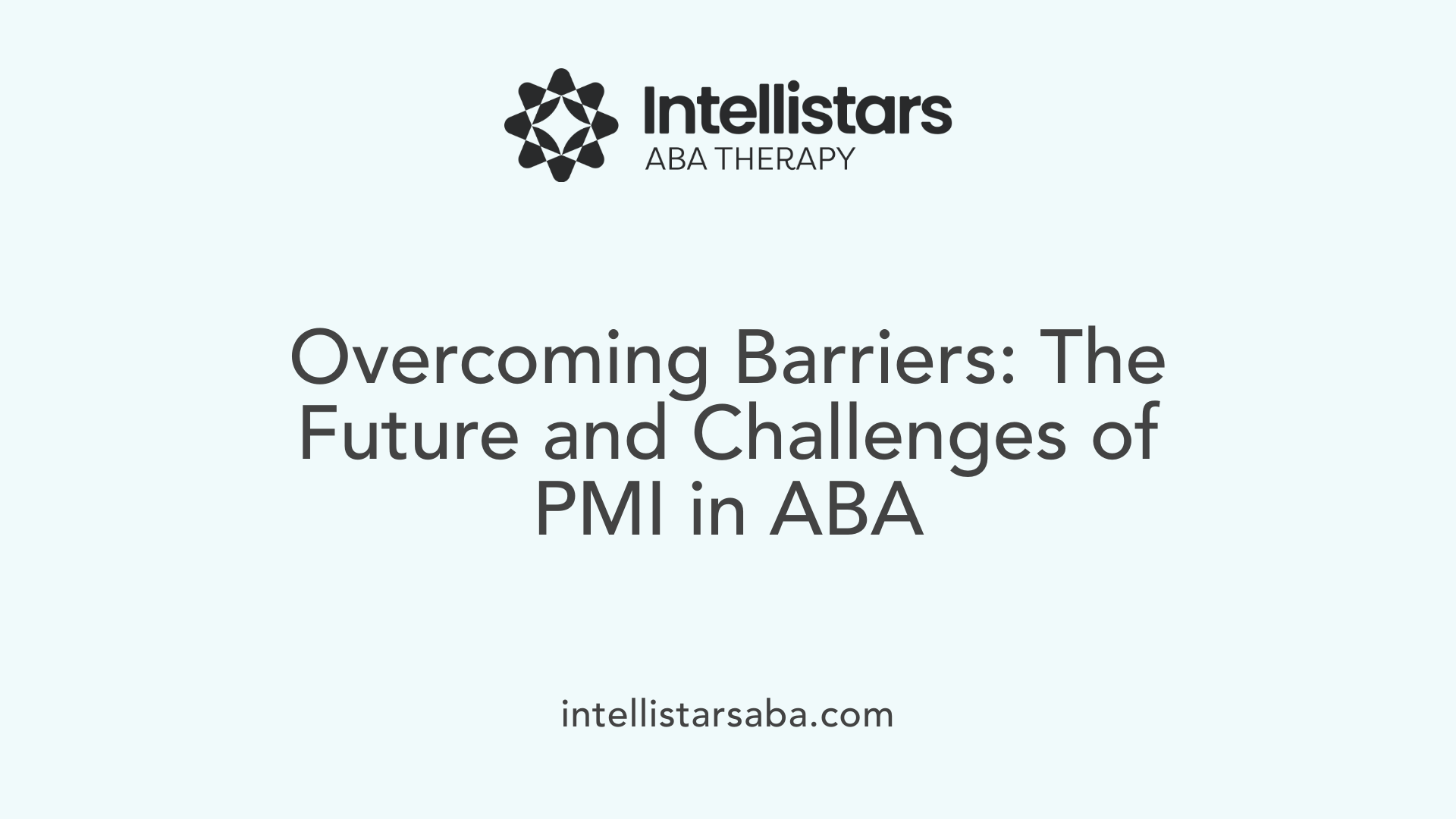
Implementation Barriers
Implementing peer-mediated intervention (PMI) in various settings often faces logistical and structural challenges. Schools and clinics may encounter difficulties in identifying suitable peer models, especially in diverse classrooms where social and academic skills vary significantly among students. Additionally, limited resources and time constraints can hinder the consistent application of PMI strategies.
Teachers and staff need training to effectively facilitate peer interactions and to maintain fidelity of the intervention. Without proper support, these programs may not reach their full potential, leading to variability in outcomes.
Fidelity and Training Needs
Maintaining high fidelity in the implementation of PMI is crucial for its success. Proper training of peers and educators involves understanding autism spectrum disorder (ASD), learning appropriate ways to model social skills, and providing positive reinforcement. Continuous professional development is necessary to keep staff updated on best practices.
Research indicates that without ongoing supervision and coaching, the quality of peer interactions can diminish over time. Therefore, establishing comprehensive training modules and regular monitoring is essential to ensure that interventions are delivered as intended.
Research Gaps and New Initiatives
While existing studies highlight the positive effects of PMI, several gaps remain. Most research has focused on short-term outcomes, with less attention paid to long-term generalization and sustainment of skills in natural environments.
Further studies are needed to explore how PMI can be integrated seamlessly across multiple settings, such as home and community, to promote consistent skill development.
Emerging initiatives are exploring technology-assisted PMI, including virtual platforms and apps, to expand reach and provide additional supports. Developing protocols that incorporate such innovations could enhance engagement and scalability.
Overall, addressing implementation barriers, ensuring fidelity through targeted training, and pursuing innovative research will pave the way for optimizing peer-mediated approaches, making them a standard component of comprehensive autism support strategies.
The Broader Impact of Peer-Mediated Instruction on Social Inclusion
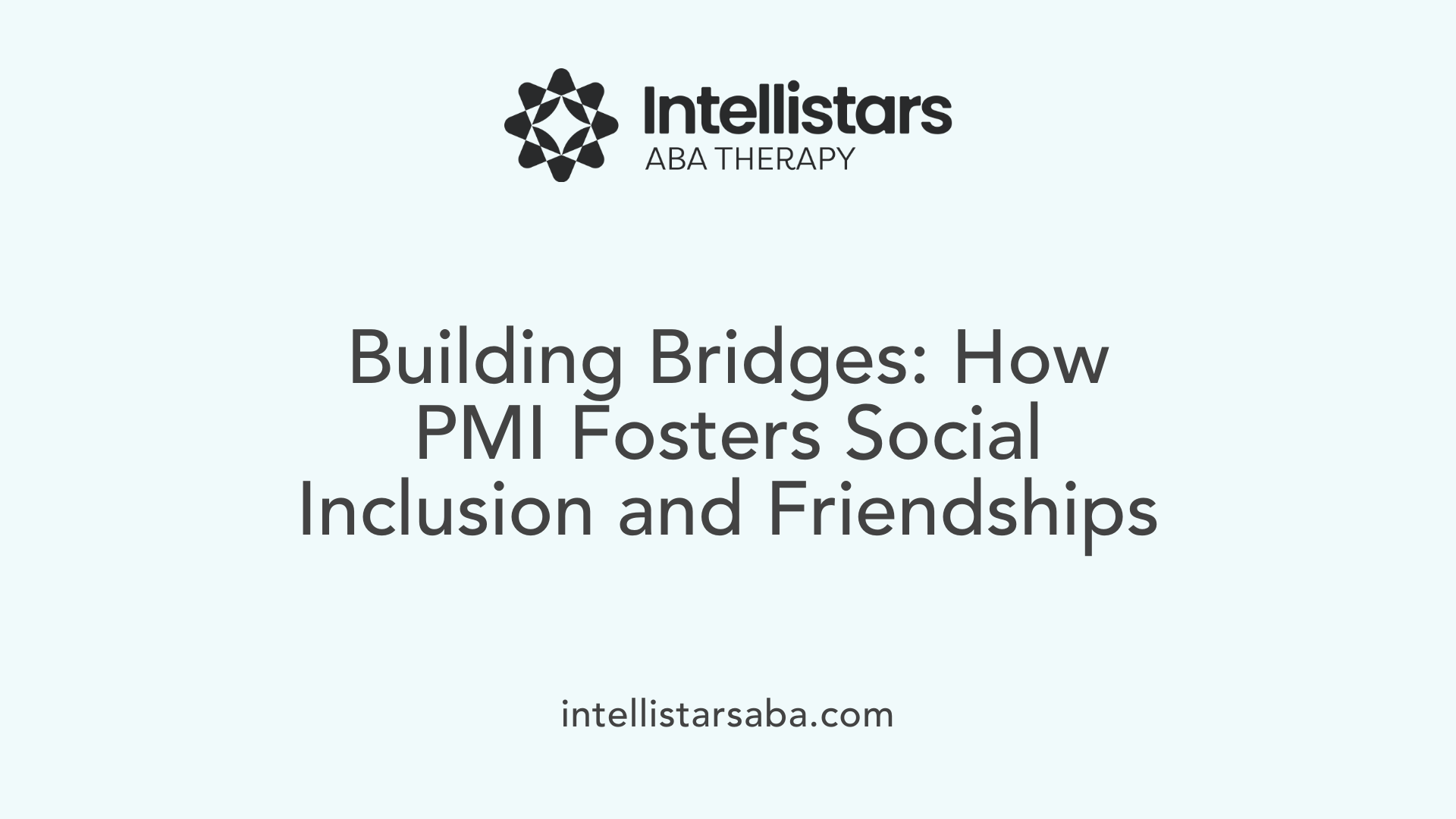
Fostering friendships and community integration
Peer-mediated instruction and intervention (PMII) offers a valuable approach to helping children with autism spectrum disorder (ASD) develop meaningful friendships. By involving typically developing peers as social models and collaborators, children with ASD gain opportunities to practice social skills in natural, real-world settings such as classrooms, camps, and community activities.
These interactions facilitate the building of bonds beyond academic tasks, encouraging shared activities like taking turns, sharing, and engaging in play. Over time, these interactions help children with ASD become more accepted and integrated within their social groups, strengthening their sense of belonging.
Reducing social isolation
Children with ASD often experience social isolation due to difficulties in initiating and maintaining interactions. Studies show that PMI can significantly increase their social motivation and communication skills, leading to increased inclusion in peer groups.
By promoting social engagement in supportive environments, PMII helps children with ASD form friendships that extend beyond structured therapy sessions. This increased social participation reduces feelings of loneliness and social exclusion, fostering a more inclusive community where children with ASD are recognized as active participants.
Empowering children with ASD and their peers
PMII also empowers both children with ASD and their typically developing peers. Peers are trained to serve as positive role models, offering reinforcement and guidance to support social interactions.
This peer involvement encourages mutual understanding and empathy, breaking down social barriers. Children with ASD learn appropriate social responses and communication skills, while their peers develop leadership, responsibility, and an appreciation for diversity.
Creating a supportive and inclusive environment benefits the entire classroom or community. It promotes acceptance, reduces stigma, and nurtures the social and personal growth of all children involved.
| Aspect | Impact | Details |
|---|---|---|
| Friendship Building | Increased social bonds | Encourages shared activities and mutual support |
| Community Integration | Better inclusion | Facilitates participation in broader social settings |
| Social Empowerment | Boosted confidence | Children with ASD develop communication and relationship skills |
| Peer Development | Leadership skills | Typically developing peers learn empathy and social responsibility |
Enhancing Social Outcomes for Children with Autism
Peer-mediated instruction has proven to be a highly effective, evidence-based component of ABA therapy for children with autism. By harnessing the social learning potential of peers, it addresses core deficits such as social motivation, communication, and engagement. Its versatility across various settings, from schools to community centers, underscores its practical significance. As research continues to affirm its benefits and explore ways to overcome implementation challenges, PMI remains a promising strategy for fostering inclusive, supportive environments that promote meaningful social development and improve quality of life for children with ASD.
References
- Effectiveness of peer-mediated intervention on social skills ...
- What is Peer-Mediated Instruction and Intervention?
- A systematic review of peer-mediated interventions for ...
- What is Peer-Mediated Instruction and Intervention?
- A systematic review of peer-mediated interventions for ...
- What is Peer-Mediated Instruction and Intervention?
- Peer-Mediated Social Skills Training






